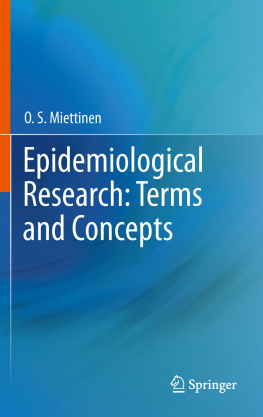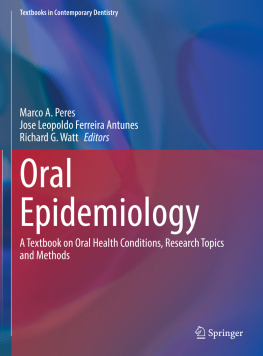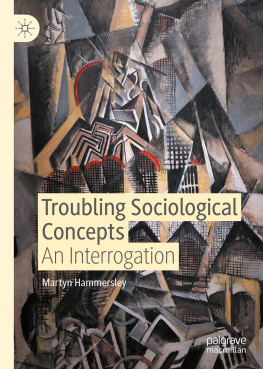1.1 Introduction
The concept of medicine is defined with art as its proximate genus in one of the two most eminent authoritative English-language dictionaries of medicine, but with art and science in this role in the other; and as the specific differences within these genera the two dictionaries give the respective concerns, preventing or curing disease and the diagnosis and treatment of disease and the maintenance of health [] leaves medicine undefined.
Critically examined, medicine can be seen to indeed be art , in the Aristotelian meaning of art (that of a productive art of making things, as distinct from science, producing knowledge epistm ); but it never is science []; and continuing progress will only accentuate this differentiation. (When no one can be a generalist, no one is a specialist either. Cf. professional engineers, musicians, athletes, )
The arts/disciplines of medicine fall in two broad categories. Most of them are disciplines of clinical medicine, the others being ones of community medicine. The latter segment of medicine is alternatively termed epidemiology (or social medicine, or preventive medicine). The definitional distinction between the clinical and epidemiological disciplines has to do with the generic nature of the physicians client(s). A clinicians clients are individuals, cared for one at a time, while an epidemiologist has a particular population as his/her single client.
Medicine is healthcare provided by a physician to his/her client(s). The essence of this care is not preventing or curing disease, nor treatment of disease and the maintenance of health; for, far from always being a feature of physician-provided healthcare, these actions are (highly) exceptional even in the practice of modern medicine, most notably as writing a prescription for a therapeutic medication is but an authorization and instruction for the client (in this case a patient) to execute the treatment.
In providing healthcare, a physicians first concern always necessarily is to get to know about the clients health (the client may not be a patient even in clinical medicine), to know about this more specifically and/or more deeply than is possible for the laity. Having attained such esoteric knowing gnosis (dia-, etio-, and/or prognosis) about the clients health, a physicians doctors responsibility and role is to teach , whenever possible, the client (or the clients representatives) accordingly (L. doctor , teacher). These two functions of doctors, and these alone, constitute the definitional essence of medicine (i.e., they are always involved in, and unique to, medicine; cf. Preface).
Medical research , while not definitional to medicine (as medicine is not a science), is not even an occasional element in medicine. It thus is not research in medicine: epidemiological research is not community medicine, nor is clinical research clinical medicine; these are research for community and clinical medicine, respectively.
Even though there now are some tendencies to extend the concepts of both epidemiological and clinical research beyond that of expressly medical research, no-one denies that both types of research are medical in part at least. In this book, both epidemiological and meta-epidemiological clinical research are viewed only from the vantage of medical research; and whereas the researcher may not have a medical background, an introduction into the here-essential terms and concepts of medicine per se also is called for. An added reason for addressing the terms and concepts of medicine per se is the still quite sketchy development of these terms and concepts even within medicine, as is manifest in todays dictionaries of medicine (cf. concept of medicine itself above). Some of these terms and concepts are addressed in the I. E. A. dictionary as well.
1.2 Mini-dictionary
Where an asterisk ( * ) is here attached to a term, it indicates the terms inclusion in the I.E.A. dictionary of epidemiology [ ] .
Abnormal (antonym: normal) See Normal.
Acquired (antonym: congenital) Concerning an illness (a case of it or the illness at large), the quality of being postnatal in origin (rather than congenital).
Acute * (antonym: chronic) Concerning a sickness or an illness, or an epidemic, the quality of being (abrupt, rather than insidious, in onset and) of short duration.
Adjusted rate * See Rate (Note 6).
Aetiology * See Etiogenesis.
Agent * Concerning a sickness or an illness, an extrinsic factor involved in its very definition (as in the case of, e.g., protein sickness, radiation sickness, tuberculosis, asbestosis, and silicosis); also: an extrinsic etiogenetic factor cause of a sickness or illness (e.g., ionizing radiation or heat as the agent in the etiogenesis of a burn).
Note: M. tuberculosis is not a/the cause of tuberculosis; nor is asbestos a/the cause of asbestosis, silica a/the cause of silicosis, etc. For in these examples the agent is definitional to the illness [].
Anamnesis In the pursuit of diagnosis in clinical medicine, the history and status ascertained by interview of the client/patient. (Gr. anamnesis , recalling.) (Cf. History.)
Anomaly In a persons soma, a marked abnormality (of structure and/or function).
Note: An abnormal test result, even if markedly abnormal, is not generally termed an anomaly.
Assessment (synonym: estimation) Concerning something quantitative, development of a view about its level/magnitude. (Examples: assessment/estimation of fitness to undergo thoracotomy and lobectomy of a lung; and assessment/estimation of left-ventricular ejection-fraction in the light of, i.a., the result of an ultrasonic measurement of it.) (Cf. Evaluation and Measurement.)
Note: By the nature of assessment/estimation, judgment is generally involved in the development of the result. (Cf. assessment of the market value of a home.)
At risk Concerning a persons future in respect to coming down with a particular sickness or illness, the quality of being seen to be by whatever assessment at non-zero risk for it. (Cf. Candidate.)
Note: Only a person not having a particular sickness or illness can be viewed as being at risk for it.
Attributable * Concerning a phenomenon of health (possibly a component of the rate of morbidity from a particular illness) in relation to a particular, potentially etiogenetic factor, the quality of the former of actually having been caused by the latter.
Candidate A person for whom a particular action (medical) is a realistic option; also: a person who could come down with a particular illness by virtue of being at risk for it. (Examples: Any woman is a candidate for developing uterine cancer so long as she is not in status post hysterectomy; and if she has been diagnosed with a case of uterine cancer, she commonly is a candidate for hysterectomy as the treatment for it.)






![Bhattacharya S K. - Epidemiological and Molecular Aspects on Cholera [recurso electrónico]](/uploads/posts/book/205862/thumbs/bhattacharya-s-k-epidemiological-and-molecular.jpg)


